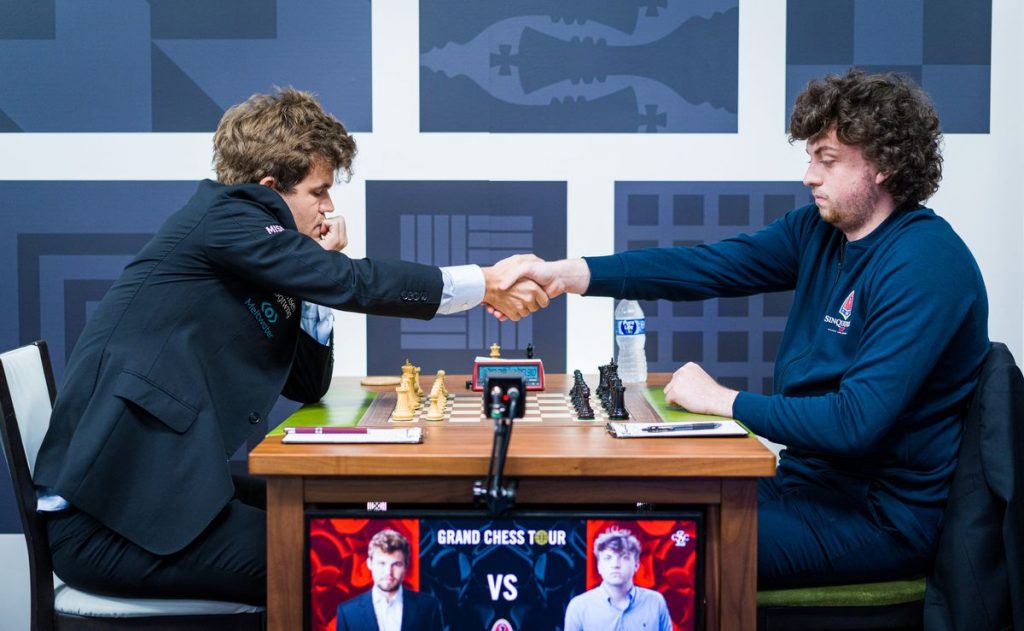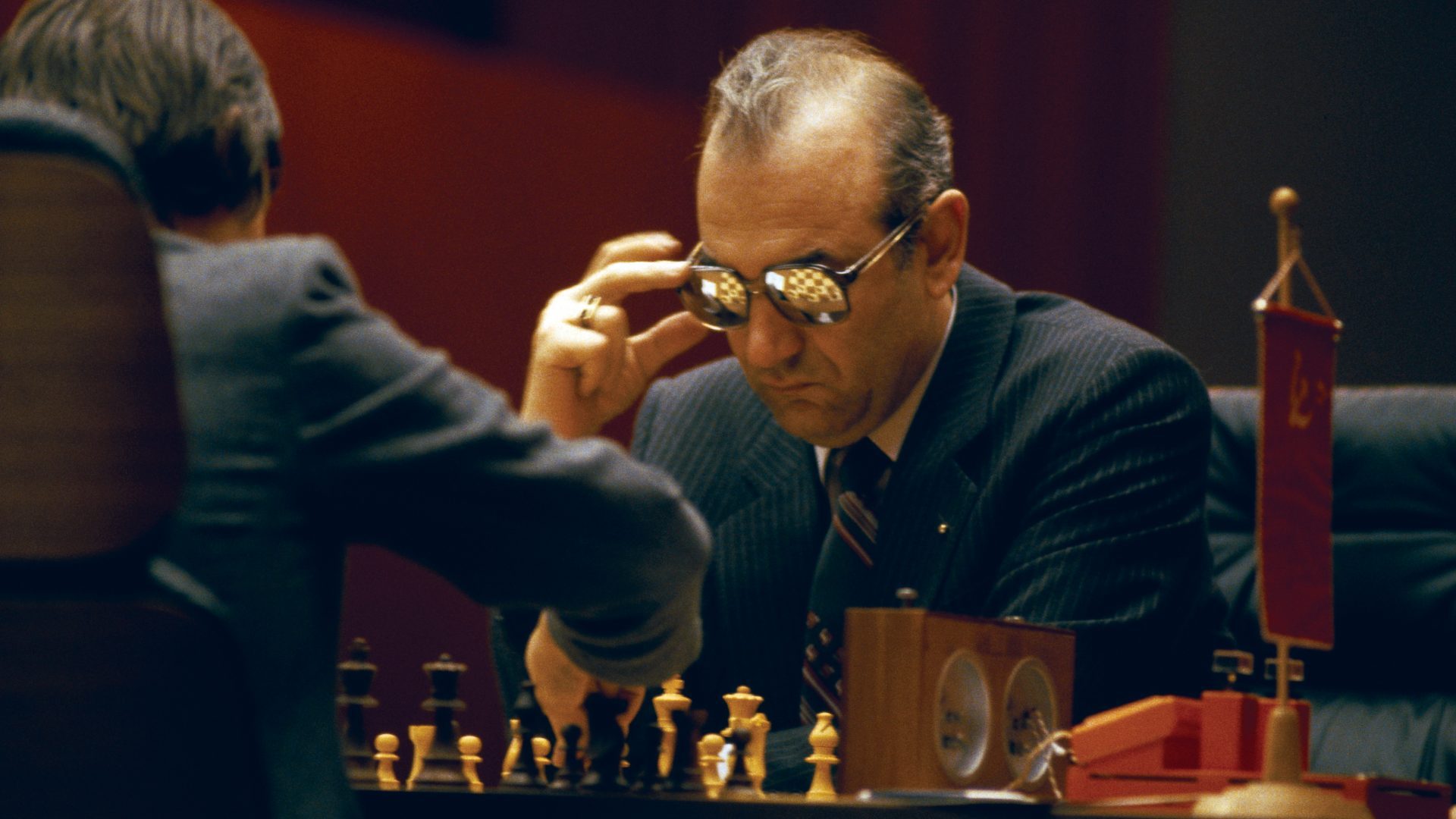In 1935, Jorge Luis Borges, inventor of magic realism, ignored by the Nobel Prize committee and a strong chess player, published his Historia universal de la infamia. This collection includes a masterpiece, Hakim, the Masked Dyer of Merv, a story set during the explosion of interest in chess that occurred within the Islamic world. In 1978 I visited Borges in his apartment in Buenos Aires. We discussed his works, especially the Infamia. Now, the global chess community is being torn apart by its own moment of infamy. Allegations of cheating have broken out at the highest level.
It all began when Magnus Carlsen, the world champion, sensationally walked out of the Sinquefield tournament in St Louis, after losing to Hans Niemann, a 19-year-old American. For Carlsen, it was the end of a 53-game winning streak. He suspected that Niemann had cheated; newspapers not normally noted for the chess coverage reported lurid speculation about vibrating anal beads. Niemann said after the game, “it must be embarrassing for the world champion to lose to an idiot like me.”
A week or so later Carlsen faced Niemann again, this time in the Bank Julius Baer tournament. Carlsen made his feelings obvious by resigning the game after playing just one move. It was an enormous insult to his opponent, a slap in the face for the other competitors and an undisguised reproach to the organisers and sponsors of the competition. In a statement, Carlsen said: “I believe that cheating at chess is a big deal and an existential threat to the game… I believe that Niemann has cheated more – and more recently – than he has publicly admitted.”
These events have sent a wave of outrage and disbelief through the world of chess. The more scurrilous parts of the chess blogosphere even suggested that Niemann had been helped at the board by means of an electronic device concealed in an intimate space about his person. Niemann responded to this conjecture by offering to play a rematch au natural.
Chess has a long and unsavoury history of bad behaviour, and How to Cheat at Chess by the multi-talented British international chess master, William Hartston, is a thorough guide to the game’s dirtier episodes. The book was partly inspired by events from the 1978 world championship at Baguio City in the Philippines. It was there that the golden boy of the Soviet chess establishment, Anatoly Karpov, took on the Soviet defector, Viktor Korchnoi. It was one of the game’s darker episodes.
For this match, I was acting as head of delegation for Korchnoi, meaning that I led the team of advisers and analysts who accompanied the player. My Soviet opposite number was the former Stalinist military prosecutor, Colonel Viktor Davidovich Baturinsky. The Soviets immediately began playing on Korchnoi’s mind when Karpov refused to shake hands. Things took a turn for the bizarre when the Soviets enlisted a sinister alleged parapsychologist, named Dr Vladimir Zukhar.
Things began to spiral when Korchnoi decided to retaliate. He did this by recruiting the banned Ananda Marga sect, a group made up of chanting, orange-robed gurus. It was certainly a distraction – but it was also somewhat sinister, as all of these gurus were on bail at the time for the attempted murder of an Indian diplomat. They busily set about levitating for a Korchnoi victory and consequent coronation as world chess champion.
Whether or not this had any effect on the outcome of the game is beside the point – both players were obviously trying to put off their opponent. This was cheating. In fact, the level of gamesmanship was so bizarre that it was even turned into a film, La Diagonale du fou (Dangerous Moves) which won an Academy Award for the best short film of 1984.
When Hartston wrote How to Cheat at Chess, he scarcely can have believed the new methods of cheating that computer technology has now made possible. Chess computers have come on at rapid speed. It is remarkable to think that, when Garry Kasparov lost his match to the IBM computer Deep Blue in 1997, he later claimed that IBM had cheated by involving human input. Nowadays, it’s the other way round – human players fear the intervention of hidden computer analysis in human games.
Britain’s most famous grandmaster, Nigel Short, has even declared the death of online chess tournaments, in which the players can operate from home. The suspicion of computer use is now too widespread. The arrival of the chess-playing machines has coincided with a huge spike in interest in the game. The wildly popular Netflix TV series Queen’s Gambit, the Covid pandemic and huge advances in the development of chess computer nanotechnology have all helped the game to grow.
Covid created a vast army of chess players competing from the safety of their own homes. And as remote play became increasingly common, the temptation to cheat has become ever more acute. At the same time, prizes began to grow dramatically, and an elite core of players started to win some handsome sums.
The arrival of big money and mass, cheap technology has had two effects. First, it has led to a serious problem with cheating. But second, it means that an unexpected defeat by a weaker opponent – as with Niemann’s win against Carlsen – can now be ascribed to cheating.

All this technological confusion is a far cry from the origins of board games, many thousands of years ago, when gaming configurations were etched into the rocks outside the lost Mesopotamian city of Ur.
Historically, race games and games of chance predate games of strategy and reason. Intellectually, games of chance represented the primitive belief that fate, chance and prevailing local deities decided the lives of humankind. Chess, along with its oriental relatives, Shatranj, Shogi, Xiang Qi and Wei Chi, or Go, posited the opposite world view, that human beings are in charge of their own fate, that we choose our moves, not fate, chance or the gods.
But that is not to imply that cheating is anything new. The 16th-century writer, Ruy Lopez (1530- 1580), recommended placing the board with the sun in your opponent’s eyes. He also advocated playing after your opponent had eaten and drunk freely – not exactly cheating, but certainly sharp practice.
Later, towards the close of the 18th century, the great Frenchman, André Danican Philidor, conducted three games simultaneously, blindfold. In earlier times this might have been considered as witchcraft, while the encyclopaedist Diderot even warned Philidor that such exertions might cause his brain to explode. However, this feat, remarkable for that time, involved talent not subterfuge.
In 1853, two championship level players, Harrwitz and Löwenthal, were engaged in a bitter chess match in London. Harrwitz himself did not cheat, but some of his overzealous supporters hired an organ grinder to make a din outside the venue, while others smoked copiously in the players’ presence. Their rationale was that the hyper-sensitive Löwenthal (who did indeed lose the match narrowly after having established an early and commanding lead) would suffer more from noise and smoke than the more resilient Harrwitz.
With the arrival of the Soviet hegemony in chess, instances of cheating and collusion became easier both to implement and to disguise, given the proliferation of Soviet grandmasters in official tournaments.
The 1962 Candidates Tournament to decide the challenger for the world championship provided one of the most flagrant examples of such Soviet collusion. The top three, all Soviets, drew their 12 games against each other. Bobby Fischer, who came fourth, was outraged. Certainly the Soviet grandmasters broke no rules, but what they did went against the spirit of the game. Of course, while the Soviets were sharing points, Fischer could have surged ahead by winning, which he signally failed to do.
When it came to Fischer’s chance for a crack at the world title, against Spassky at Reykjavík 1972, Fischer broke no rules, but his insistent campaign of gamesmanship, such as his constant demands to change conditions, combined with threats to withdraw, certainly helped to break Spassky’s morale.
In our modern computer age, the Latvian grandmaster Igors Rausis was caught on camera analysing his game in progress on his mobile phone. There could be no defence and the punishment was a lifetime ban. In the 2006 world championship Vesselin Topalov levelled the same accusation against defending champion Vladimir Kramnik. The evidence was non-existent and the claims were rejected.
In fact, the decisive refutation was that some of Kramnik’s moves were so bad that he should have lost on the spot. However, Topalov’s responses were even worse and it was he who went on to lose. Had Kramnik been guided by computer, he would certainly have avoided the blunders.
As for the dispute that has broken out between Carlsen and Niemann, it is complicated by the fact that Niemann has twice admitted to cheating in online games by using computer analysis. He now claims to be a reformed character but the stigma remains. Niemann’s admission has given Carlsen the basis for implying that he also cheated in their face-to-face game.
Such experts as former world champion Garry Kasparov, chief arbiter David Sedgwick and computer expert Professor Ken Regan, have all asserted that Niemann has a clean bill of health. That has not stopped Carlsen from mobilising the resources of his vast chess-based business empire to exclude Niemann from certain online playing outlets, such as Chess.com.
There remains one other intriguing possibility. Niemann may not have resorted to silicon assistance during his famous victory against Carlsen. Instead, there might be a leaker in Carlsen’s own back-up team of seconds and analysts, who has given away – or even sold – some of Carlsen’s strategies. Industrial espionage of that sort would not constitute cheating on the part of Niemann.
The probable outcome is that FIDE, the world chess governing body, will set up a commission to evaluate the actions on all sides. This may take some time and may well turn out to be toothless, especially where a celebrated world champion is concerned.
But if accusations against Niemann are not withdrawn and exclusions from websites are not dropped, Niemann may have to resort to the law to clear his name. Chess disputes have been settled in the courts. The Netflix TV series Queen’s Gambit wrongly claimed that the former women’s world champion Nona Gaprindashvili had never competed against male grandmasters. This was glaringly inaccurate, as I can personally testify from the game Keene v Gaprindashvili, Dortmund 1978, and the TV company was forced to reach a legal settlement.
As for the case of Carlsen and Niemann, their dispute might also be heading for a final showdown in the courts. If so, it would be a new low for the great game.
Raymond Keene OBE is an international grandmaster who has written over 100 books on chess



